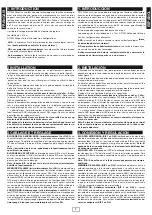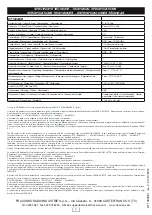
1. INTRODUZIONE
DT1000AM è un sensore a doppia tecnologia con funzione antiacceca-
mento e lente antistrisciamento, gestito da microprocessore, la sezione
infrarosso è costituita da un PIR a due elementi, la sezione a microonda
è realizzata con cavità planare da 10.525
GHz.
Grazie all’utilizzo di un algortimo
-
di calcolo del processore
è in grado di soddisfare una copertura
in lunghezza di 15 m e in larghezza di oltre 90°, garantendo un’assoluta
sicurezza contro i falsi allarmi.
il sensore DT1000AM e dotato di un regolatore di portata con il quale
è possibile settare la sensibilità da 3 a 15 mt.
DT1000AM può essere impiegato in tre differenti configurazioni:
-
AND: il sensore dà allarme quando entrambe le tecnologie vengono viola-
te
(elevata immunità da falsi allarmi.)
-
OR con protezione antiaccecamento: il sensore dà allarme quando una
delle due tecnologie viene violata
-
Antimascheramento: rileva ogni tentativo di mascherare la microon-
da o l’infrarosso passivo in prossimità del sensore.
2. INSTALLAZIONE
- Utilizzando uno strumento sottile (esempio mini cacciavite a taglio), spingere
il tastino tondo sul lato anteriore del sensore e aprire il contenitore (figura 1).
- rimuovere la scheda elettronica dal fondo del contenitore facendo leva
sulla clips lato morsetti
- forare le apposite predisposizioni che si desidera utilizzare per il fissaggio,
oppure utilizzare lo snodo
- fare scorrere il cavo di collegamento attraverso l’apposita guida sul retro
del contenitore facendolo uscire dal foro in alto.
- cablare il circuito seguendo la guida ai collegamenti .
Nota: L’altezza da terra consigliata per il fissaggio è di 2m - 2,30m.
Verificare che tutti i DIP-Switch siano abbassati (OFF) - Scollegare il mor-
setto B/S. Fornire tensione al sensore e aspettare che il led smetta di
lampeggiare. Ruotare il trimmer della regolazione portata in modo che il
sensore a microonda rilevi i movimenti alla massima distanza necessaria
(accensione del led in colore verde o rosso) “+” = maggiore portata “-” =
minore portata . Chiudere il sensore e controllare la copertura in funzio-
namento AND (accensione del led in colore rosso). Riaprire il sensore per
eseguire le successive regolazioni.
Nota : Per evitare falsi allarmi si consiglia di aumentare la portata non
oltre quanto effettivamente necessario.
NB:in fase di chiusura del rivelatore, porre particolare attenzione af-
finchè la molla del contatto tamper si posizioni correttamente nella
sede conica ricavata sul frontale dello stesso.
3. COLLEGAMENTO E REGOLAZIONE
BLOCCO MICROONDA: (dip 1 in ON) Abilitando questa funzione, l’emis-
sione delle microonde verrà automaticamente bloccata con impianto di-
sinserito (ovvero quando al morsetto B/S viene fornita una tensione di
+12Vdc rispetto al negativo di alimentazione).
Nota : lo spegnimento del-
la microonda blocca il funzionamento del dispositivo anti-maschera-
mento.
BLOCCO LED: Il blocco del led è attivo quando viene fornita una tensione
positiva (+12Vdc) al morsetto B/S ad impianto spento. Lasciare il morsetto
B/S scollegato oppure collegarlo a negativo se non si desidera il blocco
Nota: il B/S non agisce sul relè di allarme che rimane sempre abilitato
al funzionamento.
MEMORIA DI ALLARME: (dip 2 in ON) La memoria di allarme, è automa-
ticamente attivata ad impianto disattivato ed è segnalata dal lampeggio
lento del led (1Hz) con la seguente corrispondenza : rosso allarme comple-
to (microonda e infrarosso, funzionamento AND) verde allarme microonda
(solo in funzionamento OR) arancione allarme infrarosso (solo in funzio-
namento OR). Il reset della memoria è automaticamente eseguito subito
dopo il successivo inserimento dell’impianto (ovvero qualdo al morsetto
B/S viene tolta la tensione positiva di +12Vdc rispetto al negativo di ali-
mentazione).
FUNZIONE OR- Antimascheramento: (dip 3 in ON) Il sensore DT1000AM
è provvisto di un dispositivo in grado di rilevare un mascheramento del-
le microonde atto a diminuirne la sensibilità. Per tutto il tempo in cui è
presente questa particolare manomissione, il contatto MASK di tipo N.C.
si aprirà e contemporaneamente il LED del sensore lampeggerà veloce-
mente con colore rosso. Per attivare l’
antimascheramento è necessario
configurare il DIP 3 in ON .
1. INTRODUCTION
DT1000AM is a digital dual technology detector with an anti-blinding func-
tion and a scratchproof lens managed by a micro-processor. It combines
a dual element PIR and a 10.525 GHz-MW detector. Owing to its special
algorithm it is able to reach a coverage of 15 m and an angle of 90° , en-
90° , en-
, en-
suring an outstanding immunity to false alarms.
The detector can work with three different configurations:
- AND: alarm is triggered only when detection is from both technology
(maximum false alarm immunity)
- OR with DUO-MASK protection: as soon as one technology detects, the
alarm is triggered
(for maximum sensitivity)
- DUO-MASK: AND-type operation with notification of total inhibition of
one of the two technologies (after masking or tampering, etc.).
2. INSTALLATION
- By using a thin screwdriver, push the round tooth on the bottom and open
the housing (figure 1).
- Remove the PCB from the base
- Use a screwdriver to pierce the knockouts on the side of the base where you
wish to attach the detector to the wall or use the optional swivel bracket
- Route the wires via the rear channel into the base and let them pass throu-
gh the hole on the top of the housing
- Wire up the terminals following the connections shown in the figure
REMARK: the advised height from the floor is 2m - 2,30m.
Verify that all DIPswitches are OFF and disconnect terminal B/S. Supply
the detector and wait until the LED stops to flash.
Turn the trimmer to adjust the MW range, so as to let the MW detect the
movements at the distance you need (lighting of the red or green LED):
“+” = larger range “-” = smaller range. Close the detector and check the
range in AND configuration (lighting of the red LED).
Open again the detector and continue with the following adjustements.
NB : To avoid false alarms, it is advised to start the regulation from
the minimum position (-) and to increase the range not more than
necessary.
NB: while the detector is closing, make sure that the tamper contact
spring is positioned correctly in the conic seat in the front.
3. CONNECTIONS AND SETTINGS
MICROWAVE INHIBITION (dip 1 ON): If this function is active, the MW
emission is automatically blocked when the control unit is disarmed (B/S
is a 12 Vdc)
Note: stopping the MW detector disable the anti-
mask device.
LED BLOCK: The LED is disabled when +12 Vdc voltage is applied to
terminal B/S. Apply this voltage when the control unit is disarmed . B/S is
therefore used to notify the detector the control unit status.
Note: activa-
tion of B/S does not influence the alarm contact, which is in any case
enabled.
ALARM MEMORY: (dip 2 ON) The alarm memory is activated when the
control unit is disarmed and can be distinguished by the slow flash of the
LED (1 Hz) with the following mode: RED: alarm from both technologies
(MW and PIR, in AND); GREEN: MW alarm (only in OR configuration); OR-
ANGE: PIR alarm (only in OR configuration). Memory reset is carried out
by arming the system.
OR CONFIGURATION - DUO-MASK (dip3 ON): Detector DT1000AM im-
DT1000AM im-
im-
plements a device, which can detect a MW masking attempt. For the time
of this tampering, the NC MASK contact is opened and at the same time
the LED flashes quickly with a red colour.
DUO-MASK: this is a special
feature that enables to detect masking attempts of the PIR section. To
activate
DUO-MASK configuration it is necessary to set dip 3 to ON.
DT1000AM
SENSORE A DOPPIA TECNOLOGIA ANTIACCECAMENTO- DUAL-TECHNOLOGY INTRUSION DETECTOR DUO-MASK -
DETECTEUR DOUBLE TECHNOLOGIE DUO-MASK - SENSOR DE DOBLE TECNOLOGÍA ANTIDESLUMBRAMIENTO
IT
A
LIA
N
O
ENGL
IS
H






















